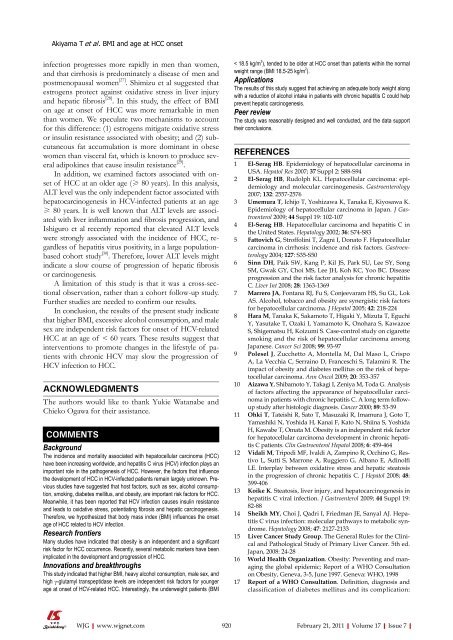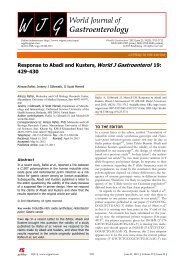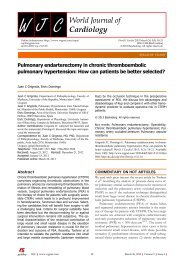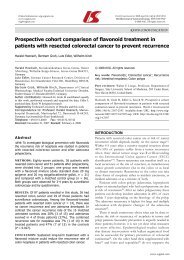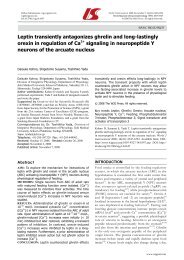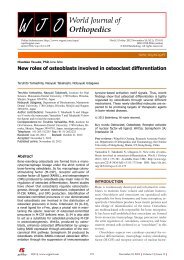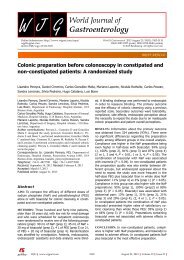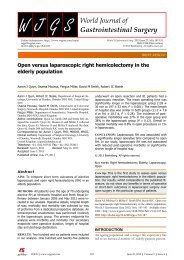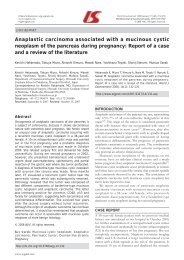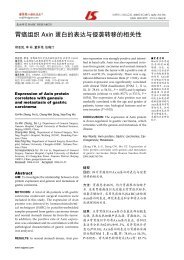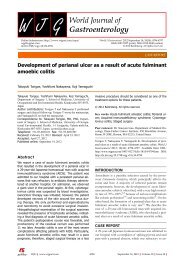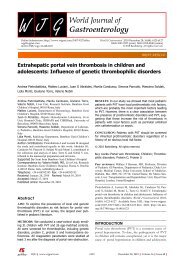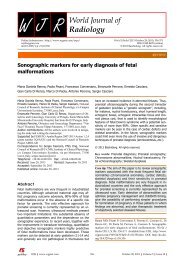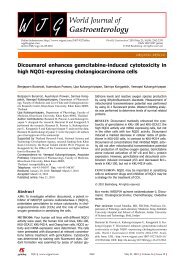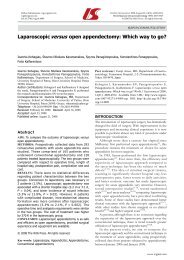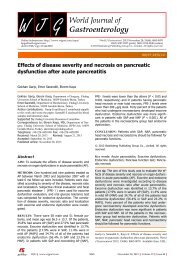Management of stage Ⅳ rectal cancer - World Journal of ...
Management of stage Ⅳ rectal cancer - World Journal of ...
Management of stage Ⅳ rectal cancer - World Journal of ...
Create successful ePaper yourself
Turn your PDF publications into a flip-book with our unique Google optimized e-Paper software.
Akiyama T et al . BMI and age at HCC onset<br />
infection progresses more rapidly in men than women,<br />
and that cirrhosis is predominately a disease <strong>of</strong> men and<br />
postmenopausal women [27] . Shimizu et al suggested that<br />
estrogens protect against oxidative stress in liver injury<br />
and hepatic fibrosis [28] . In this study, the effect <strong>of</strong> BMI<br />
on age at onset <strong>of</strong> HCC was more remarkable in men<br />
than women. We speculate two mechanisms to account<br />
for this difference: (1) estrogens mitigate oxidative stress<br />
or insulin resistance associated with obesity; and (2) subcutaneous<br />
fat accumulation is more dominant in obese<br />
women than visceral fat, which is known to produce several<br />
adipokines that cause insulin resistance [29] .<br />
In addition, we examined factors associated with onset<br />
<strong>of</strong> HCC at an older age (≥ 80 years). In this analysis,<br />
ALT level was the only independent factor associated with<br />
hepatocarcinogenesis in HCV-infected patients at an age<br />
≥ 80 years. It is well known that ALT levels are associated<br />
with liver inflammation and fibrosis progression, and<br />
Ishiguro et al recently reported that elevated ALT levels<br />
were strongly associated with the incidence <strong>of</strong> HCC, regardless<br />
<strong>of</strong> hepatitis virus positivity, in a large populationbased<br />
cohort study [30] . Therefore, lower ALT levels might<br />
indicate a slow course <strong>of</strong> progression <strong>of</strong> hepatic fibrosis<br />
or carcinogenesis.<br />
A limitation <strong>of</strong> this study is that it was a cross-sectional<br />
observation, rather than a cohort follow-up study.<br />
Further studies are needed to confirm our results.<br />
In conclusion, the results <strong>of</strong> the present study indicate<br />
that higher BMI, excessive alcohol consumption, and male<br />
sex are independent risk factors for onset <strong>of</strong> HCV-related<br />
HCC at an age <strong>of</strong> < 60 years. These results suggest that<br />
interventions to promote changes in the lifestyle <strong>of</strong> patients<br />
with chronic HCV may slow the progression <strong>of</strong><br />
HCV infection to HCC.<br />
ACKNOWLEDGMENTS<br />
The authors would like to thank Yukie Watanabe and<br />
Chieko Ogawa for their assistance.<br />
COMMENTS<br />
Background<br />
The incidence and mortality associated with hepatocellular carcinoma (HCC)<br />
have been increasing worldwide, and hepatitis C virus (HCV) infection plays an<br />
important role in the pathogenesis <strong>of</strong> HCC. However, the factors that influence<br />
the development <strong>of</strong> HCC in HCV-infected patients remain largely unknown. Previous<br />
studies have suggested that host factors, such as sex, alcohol consumption,<br />
smoking, diabetes mellitus, and obesity, are important risk factors for HCC.<br />
Meanwhile, it has been reported that HCV infection causes insulin resistance<br />
and leads to oxidative stress, potentiating fibrosis and hepatic carcinogenesis.<br />
Therefore, we hypothesized that body mass index (BMI) influences the onset<br />
age <strong>of</strong> HCC related to HCV infection.<br />
Research frontiers<br />
Many studies have indicated that obesity is an independent and a significant<br />
risk factor for HCC occurrence. Recently, several metabolic markers have been<br />
implicated in the development and progression <strong>of</strong> HCC.<br />
Innovations and breakthroughs<br />
This study indicated that higher BMI, heavy alcohol consumption, male sex, and<br />
high γ-glutamyl transpeptidase levels are independent risk factors for younger<br />
age at onset <strong>of</strong> HCV-related HCC. Interestingly, the underweight patients (BMI<br />
WJG|www.wjgnet.com<br />
< 18.5 kg/m 2 ), tended to be older at HCC onset than patients within the normal<br />
weight range (BMI 18.5-25 kg/m 2 ).<br />
Applications<br />
The results <strong>of</strong> this study suggest that achieving an adequate body weight along<br />
with a reduction <strong>of</strong> alcohol intake in patients with chronic hepatitis C could help<br />
prevent hepatic carcinogenesis.<br />
Peer review<br />
The study was reasonably designed and well conducted, and the data support<br />
their conclusions.<br />
REFERENCES<br />
1 El-Serag HB. Epidemiology <strong>of</strong> hepatocellular carcinoma in<br />
USA. Hepatol Res 2007; 37 Suppl 2: S88-S94<br />
2 El-Serag HB, Rudolph KL. Hepatocellular carcinoma: epidemiology<br />
and molecular carcinogenesis. Gastroenterology<br />
2007; 132: 2557-2576<br />
3 Umemura T, Ichijo T, Yoshizawa K, Tanaka E, Kiyosawa K.<br />
Epidemiology <strong>of</strong> hepatocellular carcinoma in Japan. J Gastroenterol<br />
2009; 44 Suppl 19: 102-107<br />
4 El-Serag HB. Hepatocellular carcinoma and hepatitis C in<br />
the United States. Hepatology 2002; 36: S74-S83<br />
5 Fattovich G, Str<strong>of</strong>folini T, Zagni I, Donato F. Hepatocellular<br />
carcinoma in cirrhosis: incidence and risk factors. Gastroenterology<br />
2004; 127: S35-S50<br />
6 Sinn DH, Paik SW, Kang P, Kil JS, Park SU, Lee SY, Song<br />
SM, Gwak GY, Choi MS, Lee JH, Koh KC, Yoo BC. Disease<br />
progression and the risk factor analysis for chronic hepatitis<br />
C. Liver Int 2008; 28: 1363-1369<br />
7 Marrero JA, Fontana RJ, Fu S, Conjeevaram HS, Su GL, Lok<br />
AS. Alcohol, tobacco and obesity are synergistic risk factors<br />
for hepatocellular carcinoma. J Hepatol 2005; 42: 218-224<br />
8 Hara M, Tanaka K, Sakamoto T, Higaki Y, Mizuta T, Eguchi<br />
Y, Yasutake T, Ozaki I, Yamamoto K, Onohara S, Kawazoe<br />
S, Shigematsu H, Koizumi S. Case-control study on cigarette<br />
smoking and the risk <strong>of</strong> hepatocellular carcinoma among<br />
Japanese. Cancer Sci 2008; 99: 93-97<br />
9 Polesel J, Zucchetto A, Montella M, Dal Maso L, Crispo<br />
A, La Vecchia C, Serraino D, Franceschi S, Talamini R. The<br />
impact <strong>of</strong> obesity and diabetes mellitus on the risk <strong>of</strong> hepatocellular<br />
carcinoma. Ann Oncol 2009; 20: 353-357<br />
10 Aizawa Y, Shibamoto Y, Takagi I, Zeniya M, Toda G. Analysis<br />
<strong>of</strong> factors affecting the appearance <strong>of</strong> hepatocellular carcinoma<br />
in patients with chronic hepatitis C. A long term followup<br />
study after histologic diagnosis. Cancer 2000; 89: 53-59<br />
11 Ohki T, Tateishi R, Sato T, Masuzaki R, Imamura J, Goto T,<br />
Yamashiki N, Yoshida H, Kanai F, Kato N, Shiina S, Yoshida<br />
H, Kawabe T, Omata M. Obesity is an independent risk factor<br />
for hepatocellular carcinoma development in chronic hepatitis<br />
C patients. Clin Gastroenterol Hepatol 2008; 6: 459-464<br />
12 Vidali M, Tripodi MF, Ivaldi A, Zampino R, Occhino G, Restivo<br />
L, Sutti S, Marrone A, Ruggiero G, Albano E, Adinolfi<br />
LE. Interplay between oxidative stress and hepatic steatosis<br />
in the progression <strong>of</strong> chronic hepatitis C. J Hepatol 2008; 48:<br />
399-406<br />
13 Koike K. Steatosis, liver injury, and hepatocarcinogenesis in<br />
hepatitis C viral infection. J Gastroenterol 2009; 44 Suppl 19:<br />
82-88<br />
14 Sheikh MY, Choi J, Qadri I, Friedman JE, Sanyal AJ. Hepatitis<br />
C virus infection: molecular pathways to metabolic syndrome.<br />
Hepatology 2008; 47: 2127-2133<br />
15 Liver Cancer Study Group. The General Rules for the Clinical<br />
and Pathological Study <strong>of</strong> Primary Liver Cancer. 5th ed.<br />
Japan, 2008: 24-28<br />
16 <strong>World</strong> Health Organization. Obesity: Preventing and managing<br />
the global epidemic; Report <strong>of</strong> a WHO Consultation<br />
on Obesity, Geneva, 3-5, June 1997. Geneva: WHO, 1998<br />
17 Report <strong>of</strong> a WHO Consultation. Definition, diagnosis and<br />
classification <strong>of</strong> diabetes mellitus and its complication:<br />
920 February 21, 2011|Volume 17|Issue 7|


